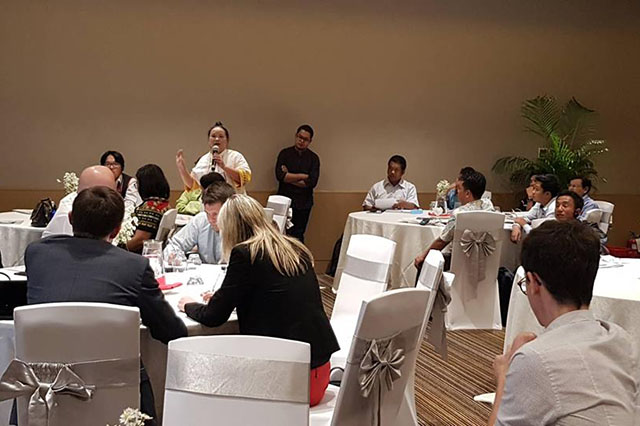VPSHR Workshop Hears From Civil Society About Mining Grievances That Can Provoke Company-Community Conflict

Around 30 participants, mostly from civil society organisations (CSOs) from Mandalay and Sagaing Regions, and Karen, Kayah, and Eastern and Southern Shan States, discussed concerns about community-company relations and security issues related to mining operations in their areas at a workshop in Yangon on 29 January.
The aim of the meeting was to introduce Myanmar CSOs to the Voluntary Principles on Security and Human Rights (VPSHR) and discuss whether they could be useful for them in pushing for more responsible extractive practices.
The VPSHR are a set of principles that companies in the extractives industries should follow when providing security for their operations in a manner that respects human rights. Previous workshops in Naypyidaw and Yangon in November 2018 had focussed on government and business stakeholders. Also participating were international NGOs working on mining, and mining companies who apply the VPSHR to their operations.
The workshop was co-hosted by MCRB in its capacity as Secretariat to the in-country Steering Group of the VPSHR, together with International Alert, Fund for Peace (FFP) (a US-based non-profit, non-governmental research and educational institution working to prevent violent conflict and promote sustainable security), and the Geneva Centre for the Democratic Control of Armed Forces (DCAF). FFP/DCAF are undertaking a study on in-country implementation of the VPSHR in a number of countries, for presentation to the forthcoming Plenary of the VPSHR in London on 18-20 March.
The workshop (see agenda) heard experience and lessons learnt in implementing the Voluntary Principles in the extractives industries elsewhere, including in Ghana, Papua New Guinea and the Democratic Republic of Congo, Peru including from Carlos Salazar of Socios Peru, the founder of the one of the earliest in-country groups on the VPSHR.
Generally few acute security problems between mining security and communities were raised, other than at Letpadaung copper mine, where the workshop heard from local activists about the grievances which sparked the 2012 violence and the Dec 2014 shooting of Daw Khin Win by public security. The other case raised was a mining company in Southern Shan State whose used armed staff to threaten local communities. However community discontent about bad mining practices was widespread, raising the risk of future security incidents. Issues raised included illegal logging by mining companies, pollution of streams by mining, damage to cultural heritage, failure by government to inspect and enforce rules, loss of land without compensation, blocked access routes, communities impacted by fighting between government, ethnic armed groups, and militias, superficial charity donations by mining companies or outright bribes (e.g. gifts of cars to critical community members to silence them), local village women ‘marrying’ company staff but then being abandoned with children when the worker returned to their country, and inability of communities to access company personnel to raise complaints. A case was mentioned of a company using Article 66(d) of the Telecoms law (defamation) after communities posted their water test findings on social media.
There was recognition of the value of multistakeholder standards like the VPSHR that community groups could use as a platform for discussing these issues, as well as the need for companies to establish operational-level grievance mechanisms and improve their transparency. Some community groups were using Myanmar laws as a basis for engaging with companies to hold them to account.
The workshop was also an opportunity to focus on the security and human rights impacts of artisanal and small-scale mining (ASM), and to discuss the scope for large-scale mining and ASM to co-exist. Workshop participants were briefed by FFP on experiences of security and ASM in Ghana and PNG, as well as by Socios Peru. In these countries, stakeholders were seeking to use the VPSHR for solutions, not always with success due to the complexities of ASM politics and multiple actors, some of them uninterested in responsible mining.
Sebastian Sahla of Natural Resources Governance Institute (NRGI) presented on issues around the decentralisation of issuance of small-scale and artisanal mining licences to state/regional governments in the 2015 Mining Law/2018 Rules, and the potential for conflict and other problems that this can give rise to if there is not a transparent and clear system for preventing overlapping licences.
PanAust, an Australian-based mining company member of the VPSHR at global level, which has received a large-scale licence and is currently embarking on a several year-long exploration programme in the Banmauk/Pinlebu area (Sagaing Region), explained their approach, noting that large-scale mining was focussed on (deeper) primary deposits, whereas ASM exploited surface level secondary or alluvial deposits. There was therefore scope for time-limited coexistence providing the licensing system allowed it. PanAust highlighted that they actively discouraged the government’s offers to provide armed security for their exploration teams, using the VPSHR to outline their reasons for their need to refuse.
PACT Myanmar spoke briefly about their plans to work on reducing mercury use in mining. MCRB plans to hold a multistakeholder workshop in Monywa in March to discuss these issues further.
The second meeting of the VPSHR Steering Committee was held on 31 January, at which FFP and Socios Peru also presented on lesson learned from the other in-country groups they had studied.
Read also
- Members of the Myanmar VPSHR Steering Committee meet the Deputy Home Minister
- Awareness-Raising Workshops Held in Yangon and Naypyidaw on the Voluntary Principles on Security and Human Rights (VPSHR)
- Steering Committee for the Voluntary Principles on Security and Human Rights Myanmar In-Country Working Group meets for the first time
- Discussion of the Voluntary Principles on Security and Human Rights
 English
English မြန်မာ
မြန်မာ မြန်မာ (unicode)
မြန်မာ (unicode)










